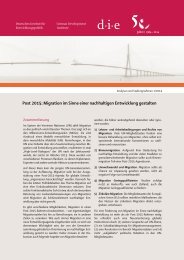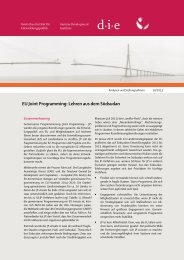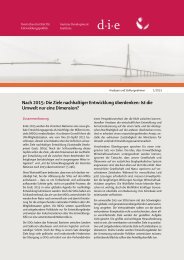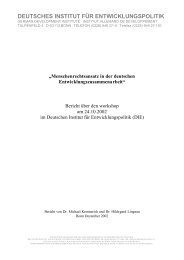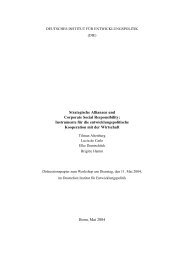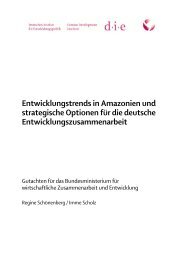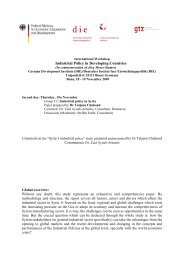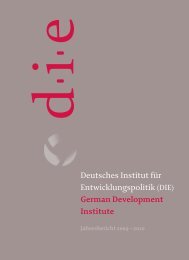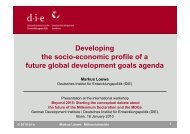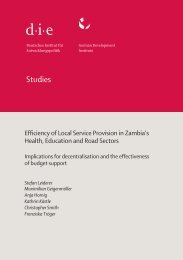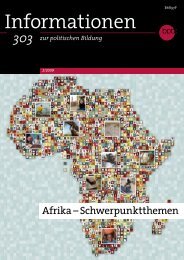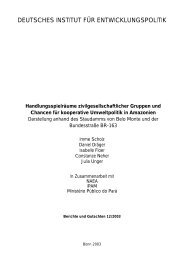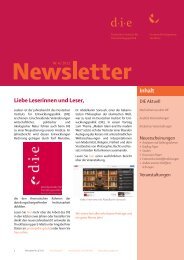Middle East / North Africa and the Millennium Development Goals ...
Middle East / North Africa and the Millennium Development Goals ...
Middle East / North Africa and the Millennium Development Goals ...
You also want an ePaper? Increase the reach of your titles
YUMPU automatically turns print PDFs into web optimized ePapers that Google loves.
66<br />
Markus Loewe<br />
Box 1 continued: Discrimination against women in <strong>the</strong> civil-status<br />
codes of Arab countries<br />
concluded); or (v) is married to several wives to whom he does not provide<br />
equal support. Fur<strong>the</strong>rmore, a married woman can at any given time petition a<br />
court for dissolution of her marriage (fasih) if her husb<strong>and</strong> does not consummate<br />
<strong>the</strong> marriage (e.g. for <strong>the</strong> reason of impotence).<br />
However, in nearly all countries of <strong>the</strong> MENA region <strong>the</strong> burden of proof for<br />
both divorce <strong>and</strong> dissolution of a marriage is on <strong>the</strong> women concerned. The<br />
consequence is a large number of protracted <strong>and</strong> grueling divorce suits, many of<br />
which are, in <strong>the</strong> end, decided in favor of <strong>the</strong> husb<strong>and</strong> for lack of evidence. This<br />
has induced some countries of <strong>the</strong> region to adopt simplified divorce procedures.<br />
In Egypt e.g. a court can grant a divorce if two court-supervised attempts<br />
at reconciliation have failed <strong>and</strong> <strong>the</strong> wife declares her willingness to renounce<br />
her claims to support <strong>and</strong> to restore her dowry (mahr) to her husb<strong>and</strong>. Legislative<br />
reforms in Morocco are headed in a similar direction. In Jordan a similar<br />
initiative was rejected by <strong>the</strong> parliament in 2003.<br />
Right to post-marital support<br />
Wives who have been repudiated by <strong>the</strong>ir husb<strong>and</strong>s are generally entitled to<br />
three months of post-marital support, unless <strong>the</strong>y were pregnant when <strong>the</strong>y were<br />
repudiated, in which case <strong>the</strong>y are entitled to support until <strong>the</strong> child is born.<br />
Fur<strong>the</strong>rmore, in cases of repudiation or divorce, <strong>the</strong> husb<strong>and</strong> must pay support<br />
for children whom he has fa<strong>the</strong>red <strong>and</strong> who are still living with <strong>the</strong> mo<strong>the</strong>r.<br />
Fur<strong>the</strong>rmore, some countries of <strong>the</strong> region have adopted legislation providing<br />
for post-marital support payments beyond <strong>the</strong> traditional three months – but this<br />
is for <strong>the</strong> most part referred to as ‘compensation for (arbitrary) repudiation,’ <strong>and</strong><br />
must only be paid if <strong>the</strong> wife has been repudiated for no fault of her own.<br />
However, a divorced wife is entitled to retain all of <strong>the</strong> assets that she has<br />
brought to <strong>the</strong> marriage or received from her husb<strong>and</strong>. The principle of separation<br />
of goods is firmly entrenched in Islamic law. Only Tunisian <strong>and</strong> Moroccan<br />
law provide for <strong>the</strong> option of joint marital property.<br />
Right to child custody<br />
In matters of child custody Islamic law distinguishes between physical care for<br />
a child <strong>and</strong> actual guardianship of a child. Up to a certain age, a child’s care is<br />
generally in <strong>the</strong> h<strong>and</strong> of its mo<strong>the</strong>r. This also applies in cases of divorce, as long<br />
as <strong>the</strong> mo<strong>the</strong>r does not remarry. In that case <strong>the</strong> fa<strong>the</strong>r can petition a court to<br />
have custody of a child removed from <strong>the</strong> mo<strong>the</strong>r <strong>and</strong> transferred to a close female<br />
relation of <strong>the</strong> fa<strong>the</strong>r (or, in a few countries, to <strong>the</strong> fa<strong>the</strong>r himself).<br />
German <strong>Development</strong> Institute



